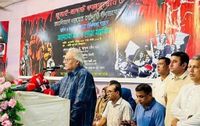In a week marked by heated debates and high-stakes summits, Bangladesh’s political and economic crossroads have come into sharp focus. As the nation prepares for a crucial national election scheduled for February 2026, concerns about political stability, inclusivity, and the ability to attract foreign investment have dominated both public discourse and private boardrooms in Dhaka.
At the heart of the debate is the role of the Election Commission (EC) and the broader responsibilities shared by political parties, the government, and civil society. On August 16, Dr. Badiul Alam Majumdar, head of the Election System Reform Commission, addressed a shadow parliament debate organized by Debate for Democracy in the capital. He was unequivocal: “The Election Commission alone cannot ensure a free and fair national election without government support.” His remarks, reported by the Daily Star, underscored the interconnectedness of the EC’s mandate with the actions of political parties and other societal actors.
Dr. Majumdar stressed the importance of holding the upcoming election within the announced timeframe, warning that only a level playing field for all parties would safeguard the process. “If political parties indulge in muscle power and money games, a good election will not be possible,” he cautioned. He also emphasized that candidates, voters, civil society, media, and political parties must act responsibly alongside the EC to ensure a credible outcome.
Student politics, a long-standing force in Bangladesh’s democracy, was another focal point. Dr. Majumdar warned against student bodies becoming mere extensions of political muscle, noting that university student union elections could have ripple effects on the national stage. “Student bodies cannot be reduced to the muscle power of political parties, as the results of university student union elections may even influence the national election,” he observed.
The urgency of consensus was echoed by Hasan Ahmed Chowdhury Kiron, chairman of Debate for Democracy. He pointed out that political parties remain divided on key electoral reforms, including whether to adopt the traditional or proportional representation (PR) systems. “If elections cannot be held within the declared timeframe, the country could plunge into a grave crisis,” he warned, urging all parties to compromise for the sake of democracy and the nation’s future.
Meanwhile, the mood outside the debating halls was equally charged. At the Jatiya Press Club, BNP Senior Joint Secretary General Ruhul Kabir Rizvi marked the anniversary of the July 2024 uprising with a somber reflection on its legacy. “The mass uprising of 2024 is one of the prime examples of how people can sacrifice their lives for the politics of Bangladesh. However, the spirit of martyrs of the uprising has been betrayed,” Rizvi declared, according to the Bangladesh Sangbad Sangstha (BSS).
Rizvi’s remarks were pointed: “During the July movement, children and teenagers came down to the streets like a flock of swallows and through this, we gained freedom, and so did democracy. Why are there allegations of extortion against those who led the movement? Is this a new repetition of Sheikh Hasina’s regime?” He suggested that the influence of the current administration had stifled the democratic gains of the past year. “It seems that Sheikh Hasina’s influence has once again taken over the country.”
Expressing frustration with the ongoing political crisis, Rizvi painted a grim picture of law and order. “The helpless people of the country are being deprived of justice while robbery and terrorism have become a daily reality on the streets,” he alleged, giving voice to the anxieties of many ordinary citizens.
Yet, even as the political climate remains tense, Bangladesh’s economic ambitions are undimmed. On August 13, the Foreign Investors Summit 2025 convened at the Sheraton Dhaka, drawing policymakers, financiers, and corporate leaders from home and abroad. Takao Hirose, managing director of Contextual Investment LLC, delivered a message that was both hopeful and cautionary. “Political stability and inclusivity are non-negotiable if the country hopes to attract long-term foreign capital,” he said, as reported by The Business Standard.
Hirose’s outsider perspective was illuminating. After arriving in Dhaka, he polled locals about the recent political transition, discovering a mix of optimism and caution. “Their answers were generally positive but guarded. Then I learned this was the first revolution in the world instigated by Gen Z, demanding better governance, accountability, and transparency. I thought — this is interesting, I believe in you.”
He credited Bangladesh’s economic ascent to grassroots pioneers like BRAC and Grameen Bank, whose microfinance initiatives empowered small businesses and women, laying the groundwork for the country’s thriving garment sector. But Hirose warned that the next phase of growth would require robust governance and a deepening of domestic capital markets. “We are fast money, we are greedy money, and we are aggressive — but we are capricious,” he said of global investors. “The moment we see you going out of control, we will go back to Japan. No violence, please. Differences of opinion are fine, but work them out. You are being watched by international investors — do not scare them off.”
He urged Bangladesh to democratize investment through technology, drawing parallels with the US in the 1990s, when deregulation and retirement plans expanded stock ownership. “You cannot democratise investment if you are still trading on stacks of paper. Develop stock trading apps. Deregulate wealth creation so that many people benefit,” Hirose advised. He also warned against overreliance on foreign capital, likening it to a “Faustian bargain” that could undermine local control.
Ruchir Desai, fund manager at Asia Frontier Investments Limited, drew comparisons with Sri Lanka’s turbulent recent history, emphasizing that “confidence is critical. You can have great companies and demographics, but without stability, the economy will not take off.” Desai noted positive trends in Bangladesh: easing inflation, rebounding exports, strong remittances, and low market valuations. “The platform has been set. If you can build a stable political and policy environment, nothing should stop Bangladesh from meeting its potential over the next five to six years.”
Bangladeshi officials, too, sought to reassure investors. Anisuzzaman Chowdhury, chief adviser’s special assistant for economic affairs, stated that the capital market is stable and ready for long-term investments, highlighting the interim government’s reforms aimed at achieving “Three Zeros” — zero poverty, zero unemployment, and zero carbon emissions. “Now is a good time to invest in Bangladesh. Our capital market is ready for long-term investments. This is a message not only for foreign investors but also for domestic ones,” he said.
BNP Standing Committee Member Amir Khasru Mahmud Chowdhury highlighted the upcoming election and its significance for both domestic and foreign investment. “Everyone is waiting for the election. With the election timeframe announced, domestic and foreign entrepreneurs are gearing up for investment. We are seeing the results today — a major delegation from Japan has come to Bangladesh to invest.”
As the debate competition at the shadow parliament concluded — with Bangladesh University of Business and Technology (BUBT) defeating Sir Salimullah Medical College — the broader contest for Bangladesh’s democratic and economic future remains unresolved. The coming months will test whether the nation can unite behind a vision of stability, inclusion, and growth, or whether old divisions and new anxieties will once again take center stage.


